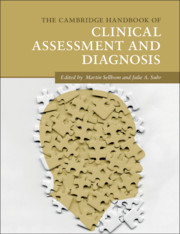Book contents
- The Cambridge Handbook of Clinical Assessment and Diagnosis
- The Cambridge Handbook of Clinical Assessment and Diagnosis
- Copyright page
- Contents
- Figures
- Tables
- Contributors
- Acknowledgments
- 1 Introduction to the Handbook of Clinical Assessment and Diagnosis
- Part I General Issues in Clinical Assessment and Diagnosis
- Part II Specific Clinical Assessment Methods
- Part III Assessment and Diagnosis of Specific Mental Disorders
- Part IV Clinical Assessment in Specific Settings
- 32 Screening and Assessment in Integrated Primary Care Settings
- 33 Psychological Assessment in Forensic Settings
- 34 Assessment Issues within Neuropsychological Settings
- 35 Assessment in Educational Settings
- Index
- References
35 - Assessment in Educational Settings
from Part IV - Clinical Assessment in Specific Settings
Published online by Cambridge University Press: 06 December 2019
- The Cambridge Handbook of Clinical Assessment and Diagnosis
- The Cambridge Handbook of Clinical Assessment and Diagnosis
- Copyright page
- Contents
- Figures
- Tables
- Contributors
- Acknowledgments
- 1 Introduction to the Handbook of Clinical Assessment and Diagnosis
- Part I General Issues in Clinical Assessment and Diagnosis
- Part II Specific Clinical Assessment Methods
- Part III Assessment and Diagnosis of Specific Mental Disorders
- Part IV Clinical Assessment in Specific Settings
- 32 Screening and Assessment in Integrated Primary Care Settings
- 33 Psychological Assessment in Forensic Settings
- 34 Assessment Issues within Neuropsychological Settings
- 35 Assessment in Educational Settings
- Index
- References
Summary
Many clinical psychologists either work with children who may be eligible for educational accommodations and special education or else work with adults who have received such services. This chapter provides an overview of assessment issues in educational settings, with a focus on K-12 schooling. We review the legal framework for special education assessment, before considering two controversial issues that interact with that framework: multitiered systems of support that delay comprehensive assessments and the question of whether students with ethnic minority backgrounds are overidentified as having disabilities. We then turn to the assessment of learning disabilities, the largest special education category; we review and evaluate major approaches to learning disability identification. Our next topic is the use of assessment data to determine which students need accommodations on classroom and high-stakes tests. Finally, we discuss an emerging issue: the measurement of effort and motivation that students exhibit during testing in educational settings.
Keywords
- Type
- Chapter
- Information
- The Cambridge Handbook of Clinical Assessment and Diagnosis , pp. 485 - 497Publisher: Cambridge University PressPrint publication year: 2019

